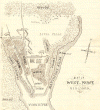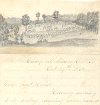Civil War Manuscripts Project
Manuscript Examinations
A-B || C || D || E-F || G-H
|| I-J || K-L || M-N
|| O-P || Q-R || S-T
|| U-V || W-X || Y-Z
Index of Names || Index of Regiments || Index by Residence
About this Project ||
Comments || Catalogs & Online Resources
Morris, John Emery (1843-1911)
Hartford
Twenty-Second Connecticut Infantry, Company B / Corporal
1862 September 3-1863 November 16
70 Items
Letters from Miners Hill, Falls Church, Arlington Heights, Hunters Chapel, Suffolk, Nansemond River, West Point, and Yorktown, VA and from Hartford, CT, Keeseville, NY, Warren, OH and St. Louis, MO. Collection also includes hand-drawn maps, pen and ink sketches and notes on the movements of the 22nd Connecticut Infantry, a nine-months unit. Also included are six letters to Morris concerning his Bontecou genealogy, 1881-1886. Morris was a talented amateur artist and photographer; the Graphics Department of The Connecticut Historical Society holds some of his photographs and his sketchbook. Letters of Civil War interest run from 3 September 1862 to 21 June 1863. See previous entry for Morris's record of service.
Location: MS 74033
Letters
Transcription
Maps and sketches prepared by John Morris
The following letters contain maps or locational diagrams and sketches: 8 November 1862; 28 December 1862; 17 January 1863; 13 February 1863; 4 May 1863, describing Longstreet's siege of Suffolk, VA; and May ?, 1863.
Letters
[Edited and transcribed by K. Nolin, M.L.I.S., Assistant Library Director, The Connecticut Historical Society]
Letters to Morris's aunt and uncle, Jonathan Flynt ("Uncle John") and Harriet Morris, 95 Main Street, Hartford, CT:
14 October 1862: "...Co A fired at a barrel yesterday and only three shots, out of the whole company hit it."
24 October 1862: ". . . another [picket] told the grand rounds to 'advance and give the counterfeit." At this time the 22nd Connecticut Infantry was brigaded with the 11th Rhode Island, the 133rd New York and the 40th Massachusetts. The letter continues, telling the story of a Company, just coming off guard near Miner's Hill, VA, who discharged their pieces into Co. B. At the first volley, 50 balls whistled through the ranks, hitting one man (the bullet was spent and the man unhurt), striking another soldier's gun, and coming within two inches from Morris's face: "Our Capt stood up and said 'whew! whew! whew!'" Following a 2nd volley, most of Company B sat on the ground, allowing the 3rd volley to pass harmlessly overhead: "It would have been much pleasanter if we could have returned the fire."
29 October 1862, Morris speaks of a march in the mud: "We carried away about two inches of the top of the road on our boots and pants the other day... we would take about two steps up [hill] and then slip back three. I thought some of turning around and starting off in the opposite direction to see if I would'nt get back to camp sooner..." Morris continues, "Some of our boys are dreadfully homesick and would give any thing to get home again. I notice that those who are the most homesick are the ones who were the most frightened when we were fired into..."
8 November 1862, Morris writes about three inches of snow mixing with the "sacred soil" and making "the tallest kind of mud." He felt, so he wrote, like a pig, entering his tent with muddy feet and clothing, "We hav'nt got so yet, that we put our feet in our plates when we eat, but we may have to come to it.... We lie so close together nights that one can hardly open his eyes in the morning with out asking his neighbor first, to take his head or his elbows out of them."
23 November 1862, Morris writes of a stove the men used in their tents during the day for warmth and which they had to remove each evening to create more room: "We attempted to sleep with it one night, but in the morning we found it lying upside down, the legs scattered about the tent, and the pipe out doors, and one of the mess has his feet in the stove door, so we came to the conclusion that there was'nt room for it in the tent, consequently its banishment." Morris also jokes about the "salt horse" ration. One joker in particular could frequently be heard at dinner time calling out, "whoa whoa, steady there."
Morris celebrated his 19th birthday on 30 November 1862.
10 January 1863, the 22nd Connecticut exchanged their "worthless Austrian Rifles" for Whitney Rifles. The flank companies retained their Enfield rifles.
18 March 1863, Morris noted their Surgeon [probably Pratt] was "half seas over" [drunk]. The men apparently had a high regard for Dr. Pease but disliked Dr. Pratt. See transcription below.
28 April 1863, near Suffolk, VA, Morris undertakes to write his letter in a position "somewhat like that of a tiger in the act of springing on his prey."
10 May 1863, Morris notes that during a rainstorm, "a shelter tent is about a[s] good as a New York Herald for keeping out the water."
Transcription
[Edited and transcribed by K. Nolin, M.L.I.S., Assistant Library Director, The Connecticut Historical Society]
West Point Va. May 19th 1863
Dear Uncle John
Your letter of the 15th was duly received and I was very glad to get it, for it has been some time since I have heard from you.
We are still engaged in the old business, digging, though not so furiously as at first, we do not work nights, now, nor Sundays. Yesterday we moved our camp a short distance back from the breastworks, and now that we have got comfortably settled, we shall probably have to pull up stakes and leave before long, in fact a rumor is current in camp that we are to go to Yorktown to do pickaxe duty. I dont think now that we shall get any nearer to Richmond. Our Company and Co A. went on picket the other night in the dark, and as there was no one to show us the way, and we were establishing a new line, we had a rather difficult time. After three hours of wandering about, in woods, swamps, and ditches and getting into every brook and slough hole in the neighborhood, we at length succeeded in getting the line posted. I was acting as orderly, and had to go the whole length of the line, and by the time I had got them posted I felt tired enough to sleep the remainder of the night, which I did in style, reclining in a gutter with my martial cloak around me, utterly regardless of 'grand rounds' or 'any other man.,' in the morning I returned to camp 'very much pleased with my adventure.' The weather has been very warm, and pleasant, though some days have been a little too hot, we frequently have thunder showers in the evening, and were it not for our rubber blankets which we put over our shelter tents we should get pretty well soaked through. One of my mess, Charlie Francis died in Suffolk the day after we left there, he had been sick four or five months, and deserved a discharged [sic] as much as any man in the Company, but Dr. Pratt would hear of no such thing though Governor Buckingham wrote to him, requesting him to do so. Dr. Pratt is fairly hated in the Regiment, and there is scarcely a man but would rather die under Dr. Pease's treatment that [than] recover under Pratt's. He has showed himself a brute, and entirely without any of the requisite qualities of a gentleman.
I dont think he understands his business very thoroughly, for I have seen him treat cases where I knew he was wrong, even with my very small knowledge of anything pertaining to the Doctors art.
You will probably see something about Charlie Francis' death in the papers and Dr. Pratts treatment of him, for I know of persons both in Connecticut and this Regiment, who will not let the matter rest until Dr Pratt is exposed perhaps the Governor will have a few words to say on the subject. We shall probably start for home in less than four weeks. I do not think I shall reinlist in this Regiment, in fact I do not think the organization of the regiment will be kept up, for there will not be enough willing to reenlist, before they have been home some time, besides I do not think the right course has been taken with this reg't to induce the men to enlist again. We came out here to fight but instead of that we have worn blacked boots and white gloves, and when an officer approaches, we have to drop any thing we happen to have, stand at attention and salute him. Besides the men dont like McClellan's tactics, they prefer to handle a gun instead of a shovel. The men are disgusted with these 'poppycock' arrangements and will not reenlist half as quick as they would if they had been allowed to do what they came out here for, whip the Rebs and end the war. And "that's what's the matter" with the whole army. Give my love to all, and write soon.
Your aff nephew John E. Morris



